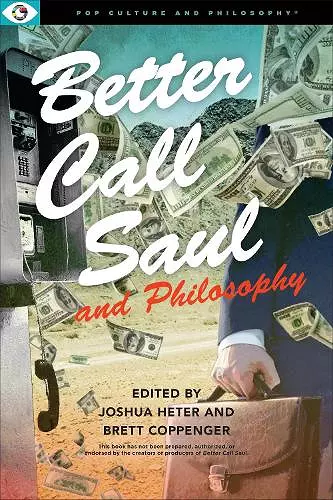Better Call Saul and Philosophy
Joshua Heter editor Brett Coppenger editor
Format:Paperback
Publisher:Carus Books
Published:28th Jul '22
Currently unavailable, and unfortunately no date known when it will be back

Better Call Saul and Philosophy: I Think Therefore I Scam is a collection of twenty-three essays exploring the philosophical themes in the hit television show Better Call Saul, a prequel to the TV show Breaking Bad. The sixth and final season of Better Call Saul aired from April to August 2022.
The central character is Jimmy McGill, whom we know from Breaking Bad as Saul Goodman. In Better Call Saul he first takes the name of Saul Goodman from the phrase “S’all Good, Man!” Jimmy/Saul is a natural con artist who not only scams from self-interest but also because he enjoys it. He has a strange relationship with his brother, the distinguished lawyer Charles McGill, who resents Jimmy’s delinquency and advantage in parental affection. Jimmy/Saul becomes a lawyer for a drug cartel, and most of the people he meets are criminals and other kinds of villains.
Like Breaking Bad, Better Call Saul raises a wide range of philosophical issues including the nature of good and evil, personal identity, free will and determinism, the law as it relates to morality, the ethical implications of the war on drugs, death and dying, and many more. Better Call Saul and Philosophy offers thoughtful fans of the show deeper and more provocative insights into the story and the characters.
Topics covered include: the morality of keeping promises to wrongdoers, the nature of psychosomatic illness, difficult moral choices facing lawyers, just how good or bad are some of the compromised characters in the show, the unintended consequences of the War on Drugs, the similarities between drug cartels and governments, whether bad people are just unlucky, the perils of self-deception, and whether we ever really have much of a choice.
Better Call Saul and Philosophy is Volume 8 in the path-breaking series, Pop Culture and Philosophy.
https://www.cheatsheet.com/entertainment/3-books-read-better-call-saul-finale.html
“This is a great read and I swear I’m not just saying that because I’m on the show! Like the other books in this series, Better Call Saul and Philosophy carries on the tradition of examining the complexity of character or, in this case, characters. What motivates them? What inspires them? But, most importantly, what inspires and motivates us to like them? This is a terrific read for those who have any interest in seemingly decent people doing terribly unseemly things. You know, like a vet who loves animals but is okay with people being murdered.”
—Joe DeRosa, a.k.a. Dr. Caldera, the animal-loving vet
“The landscape of Better Call Saul, where each character is cultivated with great subtlety and humanity, is fertile ground for focused examination. This collection is an insightful—and often surprising—look at the show’s big players, how they preen and strive, grow and fail.”
—Peter Diseth, a.k.a. DDA Bill Oakley
“Do the characters in Better Call Saul have a moral compass? Do they give a damn about ethics—and if so, in what capacity? A number of knowledgeable contributors discuss these and many more topics in twenty-three (occasionally humorous) chapters. So, before calling Saul, you Better Read this Book!”
—Dr. Marius Stan, a.k.a. Bogdan, the car wash owner in Breaking Bad
“Utilitarian decisions, musings about mortality, questions as to whether one is the same person over time, dealing with the consequences of self-deception—there’s so much philosophical content in Better Call Saul, all of which profoundly enriches the story. This entertaining and thought-provoking volume will more than help the reader appreciate that enrichment.”
—Robert Arp PhD, co-editor of Breaking Bad and Philosophy: Badder Living through Chemistry (2012)
Better Call Saul and Philosophy: I Think Therefore I Scam belongs in any media studies collection strong in analyzing television and films. Its subject goes beyond plot and character study, however, to delve into the moral and ethical dilemmas presented in Better Call Saul, requiring that readers have a basic familiarity with the subject in order to apply the philosophical reflections here. Joshua Heter and Brett Coppenger gather essays that are candid, contemporary, and often push the common scholarly tone boundaries of philosophical inspection. One such example is Joshua Luczak's "Saul's Bullshit's Not All Good, Man." Its inspection of truth, lies, and what occurs between them provides not just food for thought, but ideally discussion material highly recommended for any viewer of Better Call Saul, or for modern young philosophers who would more closely examine the connections and approaches of modern philosophy to movies and media.
-The Bookwatch: September 2022: Midwest Book Review
ISBN: 9781637700266
Dimensions: unknown
Weight: unknown
280 pages